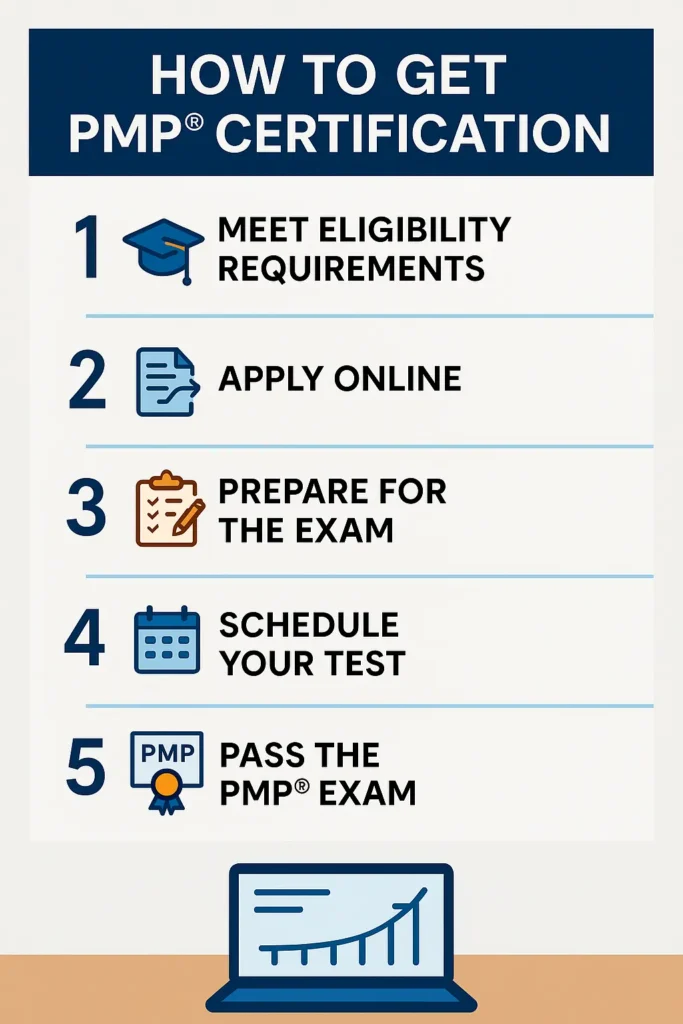How to Get PMP® Certification: Your Step-by-Step Guide to Earning the Project Management Credential
Author: Alvin Villanueva, PMP®, PMI-ACP®; Editor: Geram Lompon; Reviewed by: Grace Payumo, PMP®
You’re here because you’re ready to move your
Whether you’ve led complex projects for years or you’re transitioning from another role, the PMP® credential speaks a global language of leadership, credibility, and real-world results.
Getting certified isn’t just about passing a test; it’s about demonstrating expertise. It’s about knowing what to expect, how to prepare, and how to align your education, experience, and mindset with the expectations of the Project Management Institute (PMI®), the body behind the PMP® exam (Project Management Institute, 2024).
This guide walks you through every essential step from meeting eligibility to logging your 35 contact hours of
You’ll also discover a prep strategy that works, using practice tests, study materials, and training tools that match the real thing.
Let’s build your PMP® journey together, one well-informed, realistic step at a time.
What Is PMP® Certification and Why Is It So Widely Recognized?
The PMP certification is PMI’s flagship credential for project professionals and is recognized across various industries, including technology, construction, healthcare, and finance. It’s considered one of the top
Over 1.4 million PMP certification holders are currently working worldwide, bringing consistency, credibility, and standardization to project delivery (Project Management Institute, 2024). If you’re serious about advancing in
Who Should Get PMP® Certified in 2025?
If you’re already leading projects, even without the official title of project manager, you’re likely eligible. The PMP is designed for professionals who’ve been planning, executing, and closing out real-world projects.
Whether you work in operations, marketing, product, or engineering, your experience matters.
Is PMP right for you?
If you’re early in your career or still building project hours, the CAPM certification may be a better fit before you move on to the PMP.
Steps to Get PMP® Certified: The Roadmap for Success
Earning your PMP credential requires more than just studying.
You’ll need to meet the eligibility requirements, complete PMI-approved training, submit your application through the PMI website, and pass a comprehensive exam.
Here’s how to do it.
Understand the PMP® Certification Requirements
Your eligibility depends on your education level and
If you hold at least a four-year degree (bachelor’s degree) or global equivalent:
- 36 months of experience leading and directing projects
- 35 contact hours of
project management training or CAPM certification
If you have a high school diploma:
- 60 months of experience leading and directing projects
- 35 contact hours of training or CAPM certification
PMI doesn’t require a formal job title. What counts is your involvement in key project areas, such as scope, schedule, budget, and stakeholder communication (PMI, 2023).
Complete 35 Hours of Project Management Education
If you haven’t earned your CAPM certification, you’ll need to complete 35 hours of formal training. This is a core training requirement of the PMP application process.
Most candidates choose PMP courses that are online and self-paced, offering video lessons, downloadable resources, and realistic practice exams. Make sure the course aligns with the PMI Talent Triangle and reflects the PMBOK® Guide – Seventh Edition.
Others prefer instructor-led boot camps to stay accountable. You can choose the format that fits your learning style and schedule.
For an all-in-one study experience, many professionals rely on the ROSEMET PMP Course Bundle—a flexible, value-packed training option explicitly designed to meet PMI’s standards while keeping your preparation efficient, structured, and career-focused.
Create Your PMI® Account and Consider Membership
Visit the PMI website and create a free account. While you’re there, consider becoming a PMI member. Membership reduces the PMP exam fee and provides access to tools like:
- Digital PMBOK Guide
- Webinars and exclusive templates
- Member discounts on certifications and events
Joining PMI also connects you with a global professional network that supports your development.
Complete and submit the PMP® Application
Log in to your PMI account to start your application. You’ll need to:
- Record your project experience, including timeframes and responsibilities.
- Enter your education details.
- Upload proof of your 35 contact hours of
project management training
PMI usually reviews applications within five to ten business days. You may be selected for an audit, which requires documentation from your managers or educational providers, so keep those files readily available.
Pay the Exam Fee and Schedule the PMP® Exam
Once your application is approved, you’ll be prompted to pay the exam fee:
- PMI members: $425 USD
- Non PMI members: $675 USD
It often makes sense to pay for PMI membership first because the savings outweigh the membership fee.
After payment, you’ll receive an eligibility ID to book your exam with Pearson VUE. You can choose to test either:
- In-person at a Pearson VUE test center
- Online from home (with specific system requirements)
You’ll have one year to take the exam and up to three attempts in that period.
Prepare for the PMP® Exam with the Right Study Tools
The PMP exam focuses on how you approach real-world project challenges. It’s broken into three domains:
- People (42%)
- Process (50%)
- Business Environment (8%)
To prepare, use a mix of tools like:
- PMI Study Hall (highly recommended for real-world simulations)
- PMBOK Guide and Agile Practice Guide
- Online prep courses
- Flashcards and mind maps
- Timed practice tests and mock exams
Practice exams are critical. They build endurance, improve decision-making under pressure, and help you identify areas for improvement (PMI, 2024).
The ROSEMET PMP Course Bundle includes downloadable quizzes, timed assessments, and real-time support, so you don’t have to wonder whether you’re studying the right material or spending too much time on the wrong things.
Take the PMP® Certification Exam
You’ll have 230 minutes to answer 180 questions in various formats—multiple-choice, matching, fill-in-the-blank, and multiple responses. You also get two 10-minute breaks.
There’s no fixed passing score. You’ll receive performance ratings per domain. Aim for at least a “Target” score across all sections to boost your overall success.
With the proper preparation, tools, and strategy, you’ll be able to successfully navigate even the most challenging scenarios on the exam.
Maintain Your PMP® Certification After You Pass
Once you’ve earned the PMP credential, you must maintain it by earning 60 Professional Development Units (PDUs) every three years. These can be earned by:
- Attending PMI webinars
- Volunteering with PMI chapters
- Completing relevant
project management training
Ongoing development enhances your knowledge, deepens your skills, and keeps your certification active.
PMP® Certification Cost: What You’ll Pay and What You’ll Save
Here’s the estimated breakdown:
- PMI membership: $164 (optional but reduces total cost)
- Exam fee: $425 for members, $675 for non-members
- Training course: $200–$1,500 depending on format
- Study tools: $0–$300 for books, simulators, and guides
Estimated total cost: $800–$2,500, depending on your learning preferences and whether you join PMI.
How Long Does It Take to Get PMP® Certified?
Your timeline will vary based on experience and study availability:
- Study duration: 2 to 6 months
- Application review: 5 to 10 business days
- Study effort: 100 to 150 hours recommended
The more structured your study plan, the more efficiently you’ll reach completion and feel confident in your ability to lead.
Why PMP Certification Is a Career Game-Changer
Getting your PMP certification is more than an exam—it’s a career accelerator.
It demonstrates to employers and clients that you’ve committed to learning, practicing, and leading with intention. It opens new doors, supports higher pay, and builds your reputation as someone who gets things done.
So if you’re still wondering how to get PMP certification, the best move is to begin.
Your experience already counts. The proper training, strategy, and mindset will carry you across the finish line, fully prepared and proud to lead.
References:
Project Management Institute. (2023). PMP certification requirements. Retrieved from https://www.pmi.org/certifications/project-management-pmp
Project Management Institute. (2024). PMP Handbook and Certification Statistics. Retrieved from https://www.pmi.org/certifications/types/project-management-pmp/earn-the-pmp

